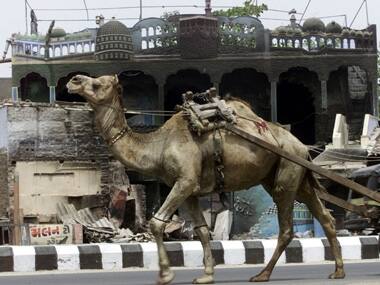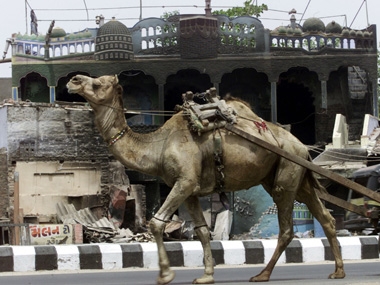An important issue of secularist principle will be decided in an ongoing case in the Supreme Court. The Gujarat government has sought a review of the state high court’s order of February 2012 asking it to repair Muslim (and a few Hindu) shrines that were damaged in the 2002 riots. The Gujarat High Court, on a petition filed by the Islamic Relief Committee of Gujarat, a non-government organisation, had ordered the state government to repair or reimburse over 500 shrines that were damaged during the riots. The Gujarat government demurred, saying it was not the job of the state to use taxpayer funds for religious purposes. [caption id=“attachment_372439” align=“alignleft” width=“380”]
 If the courts have found that the government has failed to do its job, they would be right to order corrective action.[/caption] The
high court
found the state’s contention that it would help ordinary people restore their homes and commercial establishments, but not shrines, “preposterous.” It said the state was duty-bound to protect all. The Supreme Court, while denying a stay of the Gujarat High Court order, also said much the same thing. A bench, comprising Justices KS Radhakrishnan and Dipak Misra, while asking the state government to quantify the amount needed for building and repairing those sites,
observed
: “You compensate if a house is washed away in a flood or if it is damaged in an earthquake. Then why not in case of a religious place?” the bench asked. Two points need to be made here: First, it is nobody’s case that the Gujarat government did a wonderful job of protecting the people and properties located in the state during the post-Godhra riots. So, if the courts have found that the government has failed to do its job, they would be right to order corrective action. However, there is surely some difference between a state trying to help its people for losses suffered in the riots and using state funds to restore religious places. Even though Indian secularism is not the same as European secularism, where temporal power has been divorced from religious ones for some time now, surely it is time for the Indian state to stay away from involvement with religious issues as directly as this. Secular states should not be invested in any religion or religious groups. As far as the 2002 riots are concerned, Gujarat’s duty is to find out who damaged the religious structures, prosecute them and ask them to pay for the destruction they caused. To hold the state responsible for restoring religious structures – barring those owned or managed by the state as part of its archeological heritage – is surely going to be controversial. It is worth recalling that even in 1947, when Sardar Patel sought to rebuild the Somnath temple, which was repeatedly destroyed by iconoclast invaders, Gandhi specifically asked him to rebuild it with private money, not state funds. Nehru, in fact, even wanted President Rajendra Prasad to stay away from its inauguration – which the latter refused to do. This principle has been established as early as 1947. So why break with it now? In the case of the Akal Takht, which was practically demolished by the Indian Army in Operation BlueStar, the Sikhs pulled down the repaired Takht done with government funds and used their volunteers and funds to rebuild. More recently, the Supreme Court has been advising the Union government to abandon the Haj subsidy, which topped Rs 685 crore in 2011. Even though the Supreme Court has
upheld the constitutional validity of the subsidy
in a January 2012 judgment, in May another bench called for the gradual elimination of the Haj subsidy. Article 27 of the Constitution says that no one will pay taxes for the promotion of “any particular religion. No person shall be compelled to pay any taxes, the proceeds of which are specifically appropriated in payment of expenses for the promotion or maintenance of any particular religion or religious denomination.” The Supreme Court saw no connection between taxpayer funds and the Haj subsidy since there was no specific tax being levied for the purpose (the money comes from the general budget). But the broad intent of Article 27 is surely that the state shall not fund religious activity, and not merely that it will not specifically raise taxes to do this. The Gujarat government surely also has a point when it says that it is not obliged to use taxpayer funds to repair places of worship. This is why this May, a bench comprising Justices Aftab Alam and Ranjana Desai directed the “Central government to progressively reduce the amount of subsidy so as to completely eliminate it within a period of 10 years from today.” (Read the full order
here
) The Supreme Court will have to look at issues that go far beyond justice to the victims of 2002. The Gujarat shrines case will set precedents that will be far-reaching.
If the courts have found that the government has failed to do its job, they would be right to order corrective action.[/caption] The
high court
found the state’s contention that it would help ordinary people restore their homes and commercial establishments, but not shrines, “preposterous.” It said the state was duty-bound to protect all. The Supreme Court, while denying a stay of the Gujarat High Court order, also said much the same thing. A bench, comprising Justices KS Radhakrishnan and Dipak Misra, while asking the state government to quantify the amount needed for building and repairing those sites,
observed
: “You compensate if a house is washed away in a flood or if it is damaged in an earthquake. Then why not in case of a religious place?” the bench asked. Two points need to be made here: First, it is nobody’s case that the Gujarat government did a wonderful job of protecting the people and properties located in the state during the post-Godhra riots. So, if the courts have found that the government has failed to do its job, they would be right to order corrective action. However, there is surely some difference between a state trying to help its people for losses suffered in the riots and using state funds to restore religious places. Even though Indian secularism is not the same as European secularism, where temporal power has been divorced from religious ones for some time now, surely it is time for the Indian state to stay away from involvement with religious issues as directly as this. Secular states should not be invested in any religion or religious groups. As far as the 2002 riots are concerned, Gujarat’s duty is to find out who damaged the religious structures, prosecute them and ask them to pay for the destruction they caused. To hold the state responsible for restoring religious structures – barring those owned or managed by the state as part of its archeological heritage – is surely going to be controversial. It is worth recalling that even in 1947, when Sardar Patel sought to rebuild the Somnath temple, which was repeatedly destroyed by iconoclast invaders, Gandhi specifically asked him to rebuild it with private money, not state funds. Nehru, in fact, even wanted President Rajendra Prasad to stay away from its inauguration – which the latter refused to do. This principle has been established as early as 1947. So why break with it now? In the case of the Akal Takht, which was practically demolished by the Indian Army in Operation BlueStar, the Sikhs pulled down the repaired Takht done with government funds and used their volunteers and funds to rebuild. More recently, the Supreme Court has been advising the Union government to abandon the Haj subsidy, which topped Rs 685 crore in 2011. Even though the Supreme Court has
upheld the constitutional validity of the subsidy
in a January 2012 judgment, in May another bench called for the gradual elimination of the Haj subsidy. Article 27 of the Constitution says that no one will pay taxes for the promotion of “any particular religion. No person shall be compelled to pay any taxes, the proceeds of which are specifically appropriated in payment of expenses for the promotion or maintenance of any particular religion or religious denomination.” The Supreme Court saw no connection between taxpayer funds and the Haj subsidy since there was no specific tax being levied for the purpose (the money comes from the general budget). But the broad intent of Article 27 is surely that the state shall not fund religious activity, and not merely that it will not specifically raise taxes to do this. The Gujarat government surely also has a point when it says that it is not obliged to use taxpayer funds to repair places of worship. This is why this May, a bench comprising Justices Aftab Alam and Ranjana Desai directed the “Central government to progressively reduce the amount of subsidy so as to completely eliminate it within a period of 10 years from today.” (Read the full order
here
) The Supreme Court will have to look at issues that go far beyond justice to the victims of 2002. The Gujarat shrines case will set precedents that will be far-reaching.
Gujarat shrines repair: Should taxpayer pay the bills?
R Jagannathan
• July 9, 2012, 19:32:15 IST
The Supreme Court decision on the Gujarat shrines case could have far-reaching implications for how the state deals with places of religious worship.
Advertisement
)